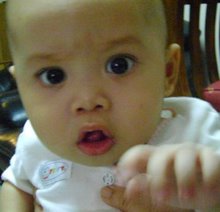Between six and nine months most babies are able to sit up unsupported and amuse themselves for longer. They will also show more interest in what’s going on around them; smiling, babbling and playing with other adults and children.
What your baby can do
Language development
How you can help
Toys for this stage
Developmental
What your baby can do
Many babies are able to sit without support, although for the first couple of weeks you’ll need to stay close by to prevent him nose-diving out of his precarious new position.
Many babies try to crawl, although it is often months before they are able to move at all, let alone crawl in the direction they want. Some babies never learn to crawl, but prefer to bottom shuffle their way around the floor

By around nine months your baby will begin to pull himself up to standing using whatever is handy at the time; perhaps the sofa or your legs. Once he is up he will probably just stand until he bumps down again, but it’s a great new vantage point, and it will increase his urgency to get on the move to examine all those exciting places he can see

Now his fine motor control is developing and he will be able to stretch out with one hand to grasp small toys, pass them from hand to hand, let go with the first hand as the fingers of the other hand close around the toy, and examine them with concentrated interest
He can poke at small things with an index finger, and begin to point. He can also use the pincer grip - holding with the finger and thumb - to pick up small objects
He can put a toy down only when it is pressed against something firm, such as the floor or your hand. (But he won’t yet give the toy to you spontaneously)
Language development 6-9 months
Your baby will love experimenting with sounds and will babble away to himself while in his cot or pram.
He will turn to your voice or a quiet noise from across the room, unless distracted
He will listen and watch adult conversations
He can shout now and will let you know! He can also begin to sing a few notes of a familiar nursery rhyme
He can combine syllables into long patterns and begins to change the pitch and tone just as you do when you ask a question
How you can help
Play ‘This little piggy’ and ‘Round and round the garden’. He will love the actions and the songs
Talk about the objects around you, so that he can match up things with their names
Use your baby’s name when you talk to him: ‘Where’s Jack’s hat?’
Look at picture books together
Toys for this stage
Stacking toys: these make use of his developing ability to organise the world around him, and develop his hand-eye co-ordination. Choose between stacking beakers (which need sorting by size to successfully complete), bricks or a set of rings of different sizes that fit over a pole. At first your baby will not be able to do them and will need you to show him how. He may then copy you or he may just like to watch or to knock yours down. Over the next few months he will get more proficient at stacking and sorting
Soft toys: offer him soft toys with interesting textures and shapes attached. He will use his mouth to explore them, and pass them from hand to hand
Mirror: babies find their own reflection fascinating. Choose a safe, unbreakable mirror specially designed for babies
Developmental tests at 6-9 months
The timing and the range of these tests vary from one health authority to another. But your health visitor will be able to tell you what happens where you live.
The tests at six to nine months include:
A hearing test
A check on physical development
An assessment of your baby’s social skills
A check on his hand-eye co-ordination
An assessment of his ability to understand
Some health visitors will formally ‘test’ your baby, others will simply watch him at play and ask you questions about his development.
In addition to these reviews your health visitor will encourage you to have your baby’s height and weight measured regularly at your local child health clinic. These measurements give you and your health visitor a good indication of how your baby is developing, so that any problems can be identified early on, and the appropriate help sought if necessary.

No comments:
Post a Comment